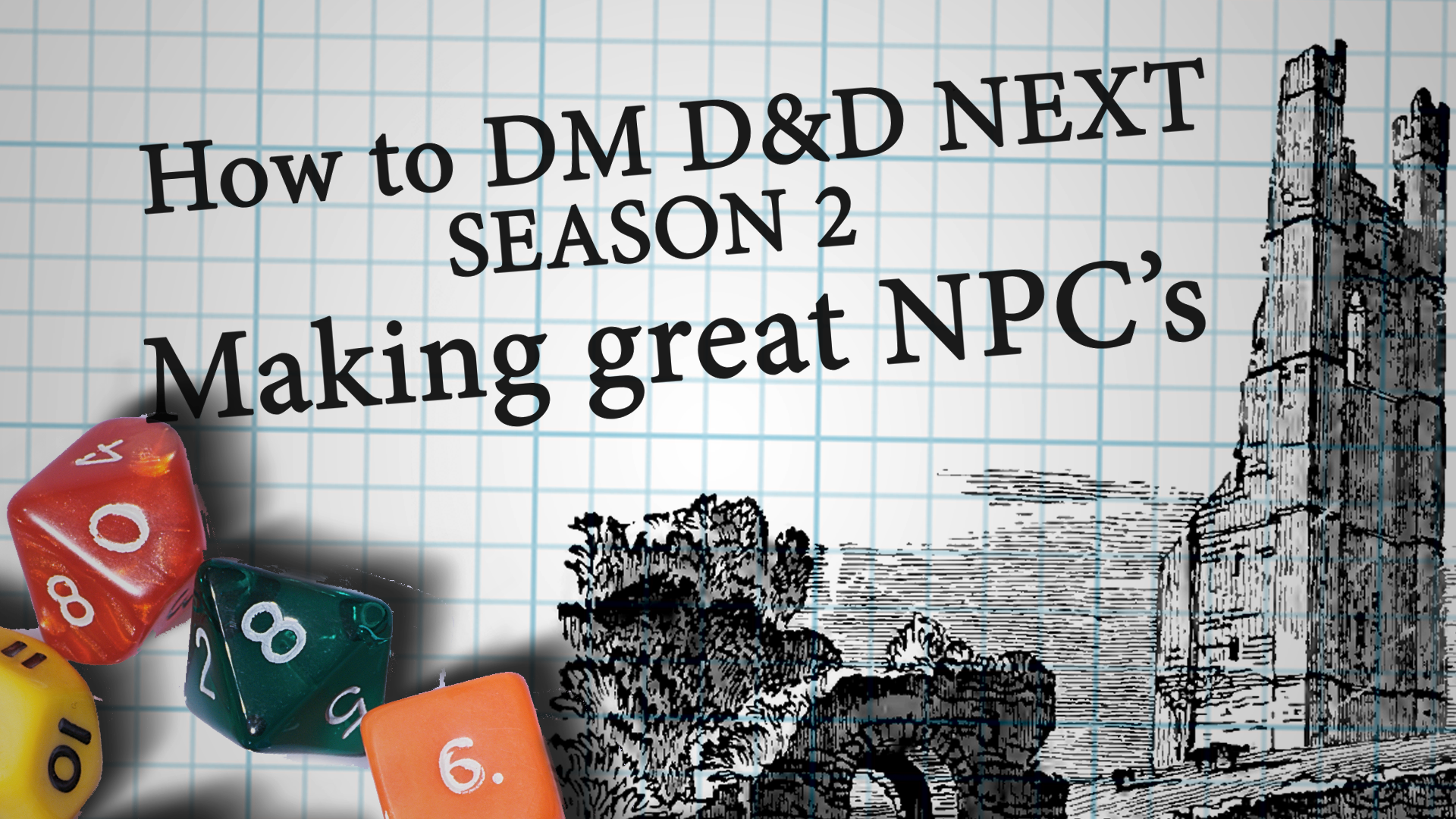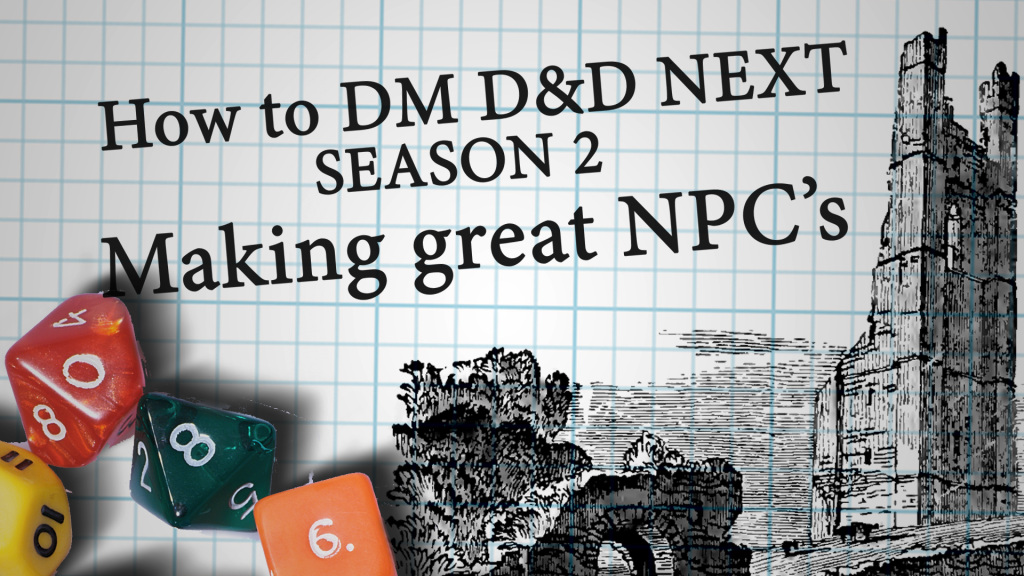Congratulations! You passed your DM 101 course! Allow me to welcome you to the new semester. We will now be focusing on how to make richer NPCs, locations, and plot lines.
Making Great NPCs
NPCs are the heart and soul of most campaigns, and learning how to create them is one of the best ways to improve your campaign. Here are a few things to think about when you get started:
“Show, don’t tell” is a commonly used phrase, and there’s a reason for it. If a character is broad or slender, rich or poor, scared or pristine, don’t simply state it. Give the players details to work with so they can imagine the character themselves. This will ensure a far more personal and unique experience than simply using a picture you found online.
Example: “A rather thin elf enters the corridor.”
“The elf opened the door just wide enough to let himself in, and it appears he only needed a few inches.”
Example: “She is wearing full plate armor.”
“Her full plate, which covers her head to toe, must have been polished earlier today. There isn’t a dent or scratch to be found on it. It is obviously the work of professionals.”
Example: “He has a large scar on his face.”
“An old scar slashed on his jaw, up his cheek, and reached all the way to his hairline. It seems as though it never fully healed.”
Secondly, make your NPCs useful. One common mistake is to make an NPC a simple quest giver or obstacle, with minimal story attached. All too often, an NPC needs to be escorted somewhere safely, or ends up getting in the way of the players doing something more interesting. Try to make NPCs useful not just to the players, but to every aspect of a conflict.
If the players are escorting a diplomat through a shady part of town where they are inevitably going to get ambushed, make the diplomat useful in combat. Don’t just give her a weapon and some levels in Fighter, instead have her give insight into the assassin’s tactics or power source, or his potential weaknesses. Make the crowd NPCs heckle and throw things at the mage who is trying desperately to concentrate on a spell, or have the crowd distract a ranger in the middle of an intense duel.

Another aspect to consider is how to introduce NPCs properly, whether the players are just meeting them for the first time or they are known from the player’s past. Unlike movies or books, In media res (starting the story in the middle of a plot point or action) doesn’t work very well in an RPG. In a movie, the spectator observes the actions of another, whereas in a tabletop game the player IS the character. Starting out in the middle of a situation can lead to a disconnect where the player doesn’t know what to do or say, and isn’t feeling the same things as their character A perfect example of this is when a lifelong friend or a close family member comes to talk to a player –if the player has never spoken to this person before, but their character has, the situation can become difficult and disconnected.
The most important thing is to make sure the NPC has value beyond giving the players a mission or errand, or making taking them hostage. Failing to do this is the fastest way to make a player resent their own backstory, and to turn any NPC into a nuisance. If you want to introduce a character from a player’s backstory, give them something the players might need. It could be a favor they can call upon, a local tavern they own, a safehouse they can offer the players to lay low in, or a useful field of expertise. These can create interesting and organic situations that don’t feel forced or contrived, and should make players feel like their backstory has value beyond being a game mechanic.
Alternately, if the players meet an NPC that they and their characters have never met before, then there is no disconnection. They will automatically have a more natural discussion than they would with characters they are supposed to already know. A good strategy is: if you make an NPC whom your players will speak to often, have your players encounter him/her as a stranger the first time. This will make it easier for the players to focus on acting as their characters, and not having to worry about staying true to their origin story.
Lastly, be sure to come up with an archetype for your NPCs. Get into the heart of what makes them great. The best part about this is that you can turn these expectations on their heads, and the players will immediately know that something is wrong.
The rumor NPC: The players hear of the deeds of this person before meeting them. “A wizard whose innovations and enhancements are known all throughout the kingdom.” When they meet the wizard, he could turn out to be a fraud or simply non-existent.
The connection NPC: She’s knows a guy for that. “A smuggler who knows the ins-and-outs of the local crime scene.” The smuggler might lose all her connections, and now needs help clearing her name of her alleged crimes.
The reliable NPC: This character is generally in the same mood every time the players see him. “The always-jolly barkeeper, greeting the heroes with a warm welcome and cold ale whenever they return.” When the barkeep does not give them the enthusiasm they are accustomed too, the players will know that something is amiss, and hopefully want to help.
The Immortal NPC: Someone who just doesn’t give up, either out of luck or maybe something more supernatural.“The peasant foot soldier who manages to survive the craziest battles and is willing to do it again and again.” If the immortal peasant dies, make sure it was the players fault, having abused his “gift” to accomplish some task. Hopefully this causes the players to seek revenge against whomever killed him.
Who are some of your favorite NPCs and what made them stand out?
Don’t forget to check Nerd Sourced later this week for Part 2: Making Great Locations.




